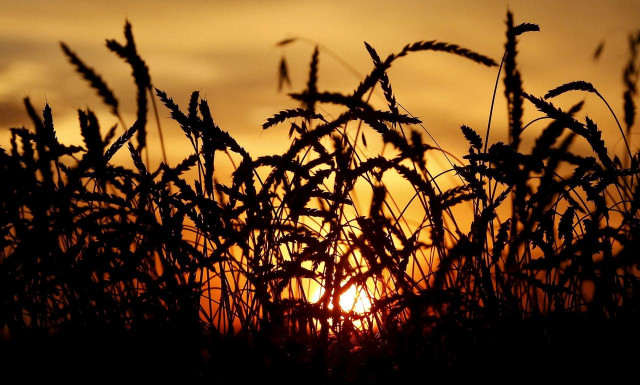ECC calls for expediting wheat import
Expresses dissatisfaction over slow pace, less-than-targeted procurement

The federal government on Wednesday gave directives for expediting the import of 1.5 million tons of wheat after procurement by the Centre and provinces fell short of the target by more than one-fifth.
The Economic Coordination Committee (ECC) of the cabinet expressed its dissatisfaction over the slow process for wheat import and less-than-targeted procurement, mainly by Khyber-Pakhtunkhwa (K-P) and the federal government-run Pakistan Agriculture Storage and Services Corporation (Passco).
Adviser to Prime Minister on Finance and Revenue Dr Abdul Hafeez Shaikh chaired the ECC meeting.
The ECC had allowed import of 1.5 million tons of wheat but so far not even one letter of credit has been opened by the private sector. The food ministry has issued 122 permits for the import of about 72,500 tons but due to higher prices in the international market nothing could be imported.
Federal and provincial ministries are working at a slow pace amid rising prices of wheat and wheat flour, and hoarding of the commodity. The cost of imported wheat including freight charges is estimated at $280 per ton and the country will bear a total cost of about $420 million on the import of 1.5 million tons of wheat.
In order to ensure the availability of wheat and flour throughout the year and at affordable prices, the ECC directed the Ministry of National Food Security and Research to accelerate efforts for wheat import, according to a statement of the Ministry of Finance.
The ECC gave the directive that the Ministry of National Food Security should hold a meeting with major importers of wheat at the earliest and come up with proposals that may indicate the expected price of imported wheat and if there was any need for the government to allow subsidy to keep prices stable in the domestic market, stated the ministry. The food ministry briefed the ECC that the provincial governments and Passco had already achieved 79% of their procurement targets and had purchased 6.45 million tons of wheat.
The ECC had set the procurement target at 8.25 million tons for the current year. As against the target of 4.5 million tons, Punjab procured four million tons of wheat from the farmers.
Sindh procured 1.23 million tons against the target of 1.4 million tons, Passco procured 1.17 million tons compared to the target of 1.8 million tons and Balochistan procured 66,000 tons against the target of 100,000 tons.
However, the K-P government procured only 19,800 tons against the target of 400,000 tons. The ECC expressed its reservations about the provincial government’s failure. More than 120 importers have so far shown interest in wheat import. The ECC directed the food ministry to extend requested facilitation to the importers including waivers from different taxes and duties.
It was also assigned by the ECC that the provincial governments, Trading Corporation of Pakistan (TCP) and Passco may arrange wheat imports as soon as possible to avoid shortages any time during the year.
Planning Minister Asad Umar questioned the delay in import of wheat as it was causing price instability in the market. He also said the cost of subsidies was not more than Rs5 billion and yet wheat could not be imported, according to an official who attended the ECC meeting.
A representative of the food ministry replied that higher prices in the international market were hampering the import of wheat. The Pakistan Tehreek-e-Insaf (PTI) government has not allocated any money in the budget for giving subsidy on the import of wheat.
The government has set the wheat support price at Rs1,400 per 40 kg and after including incidental charges, it costs Passco Rs1,650 per 40 kg.
The Punjab government has fixed the wheat release price to the mills at Rs1,450 per 40 kg and the import price is higher than this, which requires subsidy.
The ECC allowed, in principle, the Asian Development Bank (ADB) to float Pakistani rupee-denominated bonds amid concern expressed by some members.
After the economic affairs ministry raised objections over the ADB’s bid to float bonds, the State Bank of Pakistan backed the proposal and suggested that the maximum bond limit should be $200 million.
Local currency proceeds of the bonds shall be used for financing long-term infrastructure and energy projects in Pakistan, according to the finance ministry.
The ADB will charge a fee for floating the bonds and the government will waive taxes.
The ECC also allowed the Finance Division to release Rs1 billion to Sui Southern Gas Company (SSGC) for undertaking gas supply to the localities/villages falling within 5km radius of gas fields in order to comply with the Supreme Court and High Court decisions.
The ECC allowed equity investment abroad amounting to SAR 22.5 million by Eastern Products Ltd. The ECC also approved an increase in the limit for investments abroad (to be approved/allowed by the SBP) from $5 million to $10 million, beyond which permission will have to be sought from the ECC.
Published in The Express Tribune, July 16th, 2020.
Like Business on Facebook, follow @TribuneBiz on Twitter to stay informed and join in the conversation.



















COMMENTS
Comments are moderated and generally will be posted if they are on-topic and not abusive.
For more information, please see our Comments FAQ